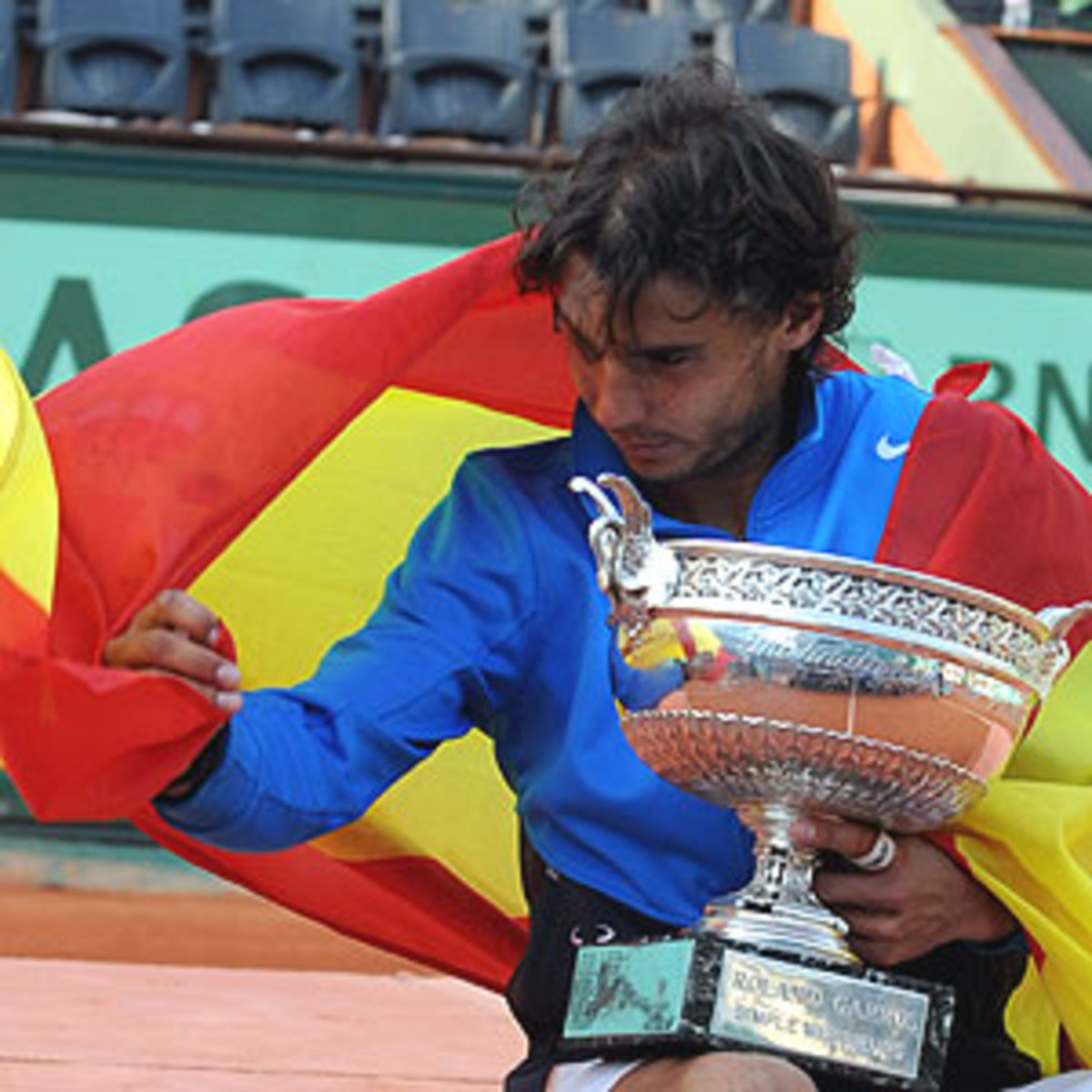With another win over Federer, Nadal builds own case as greatest
A dozen thoughts on Rafael Nadal's 7-5, 7-6, 5-7, 6-1 victory over Roger Federer in Sunday's French Open final:
1. More than any shot, I'll remember the look on Nadal's face during the Spanish anthem, the tears on his father's face, and the sight of Nadal still on court a half-hour after the match's conclusion, draped in a Spanish flag and celebrating with a small but passionate group of countrymen. In any language, Nadal struggles to express the nature of his dominance; he's much better at revealing self-doubt. In triumph, the visuals say it best.
2. It was a match rich in historical significance, and John McEnroe captured the essence beforehand when he called it "the most important match of Roger's career." With a victory, he would own at least two championships in each of the four majors, and it would be difficult to stake a claim for any other player as the greatest player of all time.
3. Instead, Nadal stays in that conversation with his 10th major title and more evidence than ever before. As Mary Carillo said during the NBC telecast, "Nadal's going for his 17th win against Federer (against just eight losses). The greatest player of all time can't beat the greatest player of his own time?"
4. Nadal admitted afterward that Federer is "almost unstoppable" when he's playing loose and relaxed, and that was definitely the case in the first set as Federer, coming off his epic victory over Novak Djokovic, played like a man with nothing to lose. He ended three games by coming in behind a serve to crush a winning volley. He was creeping inside the baseline to answer Nadal's second serves with forceful backhands. He was fearless, artful, willing to try anything.
5. And then came that fateful drop shot, a true indication of how he felt at the top of his game. It was set point at 5-2, and that feathery backhand fell just wide. It didn't seem terribly costly at the time, but that's the exact moment when Federer lost his sense of invincibility. Nadal wound up holding masterfully with a huge cross-court backhand winner, getting himself back into the set.
6. Two service breaks were the keys to Nadal finishing off the crucial first set, each featuring a sensational point. Facing a break point at 5-3, Federer unloaded a cross-court backhand that appeared to be taking Nadal right off the court. But he got there, answering with a strong forehand down the line, and Federer missed with a lunging volley. Then, Federer serving at 5-5 and deuce, Nadal looked thoroughly victimized at the net as Federer unloaded a wicked backhand to the body from point-blank range. Nadal somehow responded with a one-handed backhand reflex that acted as a lob, forcing Federer to scramble back to the baseline. The ball was actually behind Federer when he managed to flick it back, but it set up an easy winner from Nadal. Two great bits of glory from the greatest practitioner of defense the game has ever seen.
7. Stay in that 11th game for a moment. Just as we saw in the Li Na-Francesca Schiavone women's final, there was a moment when the Hawk-Eye replay system was sorely missed. Up against break point, Federer thought he'd struck an ace down the middle, but the chair umpire came down to find the spot and rule it out. Stuck with a second serve, Federer lost the point and the game was gone. Sorry, but these spot-checks are just a bit too primitive in the age of high technology.
8. Armed with such extensive knowledge of Nadal's game -- every nuance, every strategical option -- Federer was certain a Nadal forehand was sailing out at 3-2 in the second set. Not quite. The ball had such wicked topspin, it landed right on the line as Federer, who had given up on the ball, stood and watched.
9. Federer was handed a karmic favor as the second set reached a climax. With a sudden rainstorm in progress, Nadal lost a set point when his forehand clipped the tape and sailed out. It was back to deuce -- just in time for a 10-minute rain delay. Federer not only savored the reprieve, he looked fully rejuvenated as the match resumed. With people scrambling to come back into the arena and find their seats (no warmups were allowed), Nadal shanked a forehand to bring the set even at 5-5, and Federer got it into a tiebreaker.
10. Right then, out of nowhere, Federer's signature shot -- the forehand -- let him down. First came a couple of forehand errors on his own serve, then a sloppy forehand return off a second serve, handing Nadal a 5-2 tiebreaker edge. This time, the Spaniard made no mistake in finishing off the set.
11. Nadal tied the great Bjorn Borg for the most French Open titles in history (six), and now he's closing in on something that, in my mind, is even more remarkable: pulling off the French-Wimbledon double three times. Borg did it three consecutive years (1978-80), an accomplishment that borders on the surreal.
12. It's remarkable how quickly Djokovic disappeared from the conversation. There's no discounting his near-record winning streak and his complete dominance of the tour through May, but there were times during this final when I reckoned I was watching the best possible tennis between the most desired competitors. That was a universal belief, certainly, during Nadal's unforgettable win over Federer at the 2008 Wimbledon. We have arrived at an exceptional time in the game's history.






